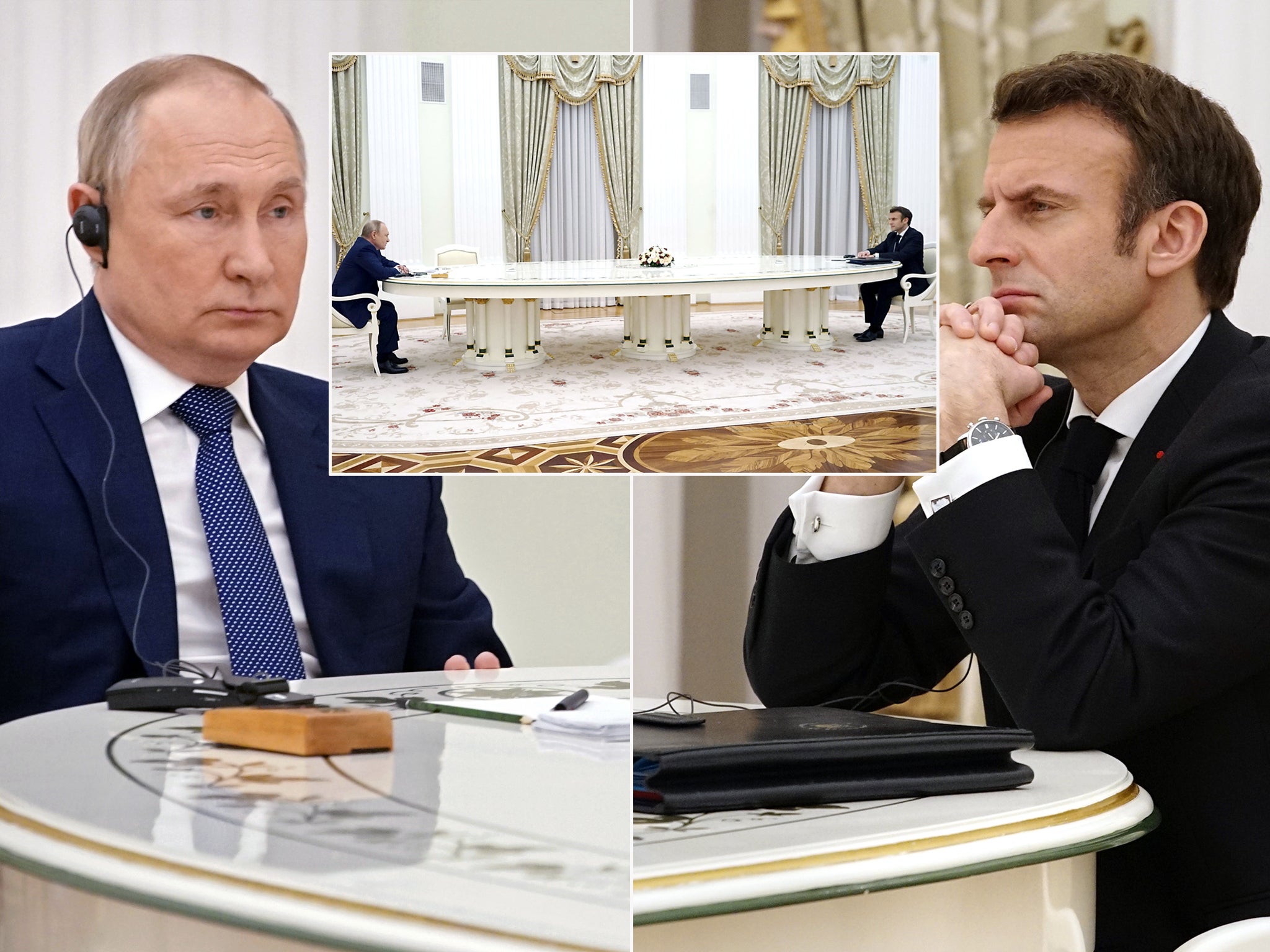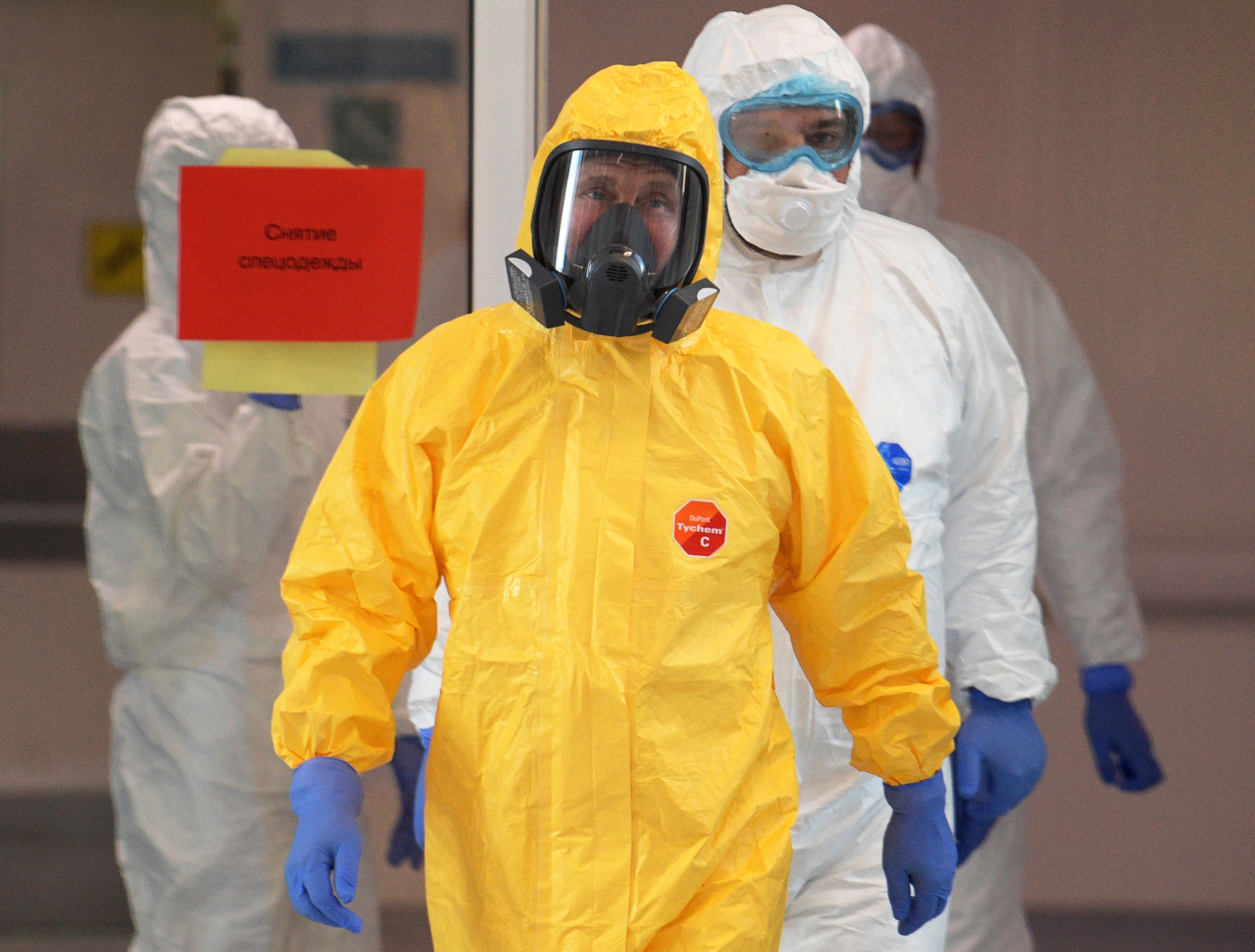Putin’s long table: Are Russian president’s meetings with world leaders Covid-conscious or a power play?
The huge table separating Vladimir Putin and his guests has now gone viral on multiple occasions

The build-up to Vladimir Putin’s recent meetings with Emmanuel Macron and Olaf Scholz focused on how the leaders might bridge a political gulf over the Ukraine crisis. Yet it was the physical distance between them that dominated the online discourse after talks began.
At their meeting last week, Russia’s president sat his French counterpart more than 10ft away from him at the other end of a long, oval table in the Kremlin, generating mirth and memes on social media while commentators debated whether the seating arrangement was a Covid precaution or deliberate power play.
Just over a week later, the German chancellor became the latest European leader to get the long table treatment at the Kremlin, as tensions simmered over a possible Russian invasion of Ukraine.
Mr Putin has also recently hosted Hungary’s strongman Viktor Orban – his closest ally in the European Union – and Iranian president Ebrahim Raisi, in both cases maintaining distance from his counterparts at opposite ends of the outlandishly large table.
Dr Ben Noble, associate professor of Russian politics at University College London, believes the Kremlin is nervous about the possibility of Mr Putin contracting Covid – mainly due to the political fallout if the 69-year-old was to fall seriously ill or die.
“Given Putin’s centrality to the functioning of the current system – which often relies more on informal connections than formal institutions – his illness poses an existential threat to its continued functioning,” Dr Noble told The Independent.
“A question of personal health, therefore, becomes a question of national security, especially given uncertainty about who would actually take over if he were to become seriously (or gravely) ill,” said Dr Noble.
It is safe to say that the Russian president was more Covid-conscious than many world leaders in the early stages of the pandemic – implementing stringent measures at a time when British prime minister Boris Johnson was hospitalised with the virus after he boasted of having shaken hands with patients at a hospital.
In early 2020, anyone seeing Mr Putin in person had to present a negative Covid test. A few months later, people visiting his residence outside Moscow or meeting him in the Kremlin had to pass through a special disinfection tunnel.

At that point, the president was mainly working from home rather than at the Kremlin, hosting video conference meetings from a room that his critics called a bunker.
The Kremlin later imposed a mandatory two-week quarantine for people scheduled to meet Mr Putin face-to-face, according to a September 2020 report by investigative news outlet Proekt , which was last year outlawed by the government.
When the president was seen coughing frequently during a government meeting, last year, he reassured officials that he was fine and being tested for Covid on a daily basis.
Despite such precautions, other analysts do not believe that Mr Putin is overly concerned about coronavirus – pointing to photographs of recent Kremlin meetings showing him sat in close proximity to Russian officials and highlighting the president’s recent trip to Beijing for the Winter Olympics where he did not wear a mask.

Olga Khvostunova, director of the Institute of Modern Russia – a US-based think tank – said the deliberate distance established between Mr Putin and Mr Macron at Monday’s meeting was about control rather than coronavirus.
“It is to make Macron uncomfortable, to show who is boss in these situations,” she told The Independent.
“It’s all about unnerving the opponent – state leaders are not used to being treated this way, so it is often quite effective – and, at the same time, signalling to the supporters that Mr Putin has got the upper hand. It’s what Russians call a ‘subtle trolling’ (tonkiy trolling).”
Dr Noble, however, believed that the Russian leader may have kept his distance from foreign leaders at these recent meetings because he knows relatively little about their Covid precautions compared to the steps taken by officials in Russia.
And a separate picture, published on Monday, showed Mr Putin sitting at a different table – but an equally lengthy distance – from the Russian foreign minister, Sergei Lavrov, who last week met with his UK counterpart Liz Truss 10 days after she had tested positive for coronavirus.

Ultimately, the academic said he did not think it was a case of either one thing or the other, emphasising that the “Kremlin can be mindful of coronavirus, whilst also using the table to project power”.
Claiming to have created the table 25 years ago, interior designer Renato Pologna told the Italian Corriere della Sera newspaper last week: “It may be useful for the purpose but certainly the length has nothing to do with the pandemic.”
Mr Pologna said that the table was just “a very small part” of work he carried out at a building in the Kremlin between 1995 and 1997.
“I recognised it as soon as I saw it. I am proud of it, I always get excited when I see that my work is in the background of something important. I hope it brings good luck against the war,” Mr Pologna said, adding that he found the online discussion of the table “really funny”.
With the Putin-Macron talks having failed to make a breakthrough amid rising fears over a possible Russian invasion of Ukraine, it was perhaps unsurprising that social media users seized on the table for entertainment – spawning countless quips and memes.
Photoshop was used to great effect, with Twitter users turning the table into a badminton court and a seesaw.
“Did this turn into a shouting match, kinda by default?” read a tweet by celebrity and entertainment website TMZ.
Some posts were playful: “Macron, can you pass the salt?”
While others were more pointed and political: “There is more space between Macron and Putin than between the Russian troops and the Ukrainian borders,” tweeted journalist Sébastien Gobert.
Join our commenting forum
Join thought-provoking conversations, follow other Independent readers and see their replies
Comments


Bookmark popover
Removed from bookmarks